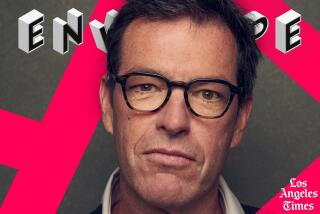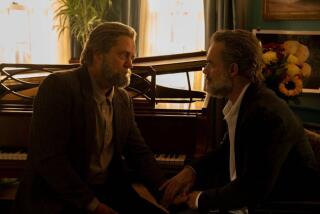‘Deadwood’ suits up for death dance
- Share via
Much as I admire “Deadwood,” David Milch’s trippy western set in a gold rush camp in the Black Hills of South Dakota, I can’t get with the outrage at HBO for canceling it (experience the venom at www.savedeadwood.tv).
Yes, I know Milch had intended his story of the Old West to play out over four seasons, but it’s a western, we know how it ends -- with gunplay, death and a classic soliloquy, not necessarily in that order.
That HBO reportedly balked at renewing the actors’ salaries on “Deadwood” is bad for the actors (and there are many of them, all colorfully realized), but not necessarily bad for Milch, whose important credits as a TV dramatist include “Hill Street Blues” and “NYPD Blue.”
Milch is such a committed, wracked personality, so uncommon in a TV world threatened by a wave of J.J. Abrams wannabes, that I’m anxious for him to move out of the American frontier and onto the next thing that strikes his fancy (a show based on the “surf noir” novels of Kem Nunn, apparently, to which I say, great, wonderful, sign me up).
Milch, having hit 60, is at an age when many TV writers have been unceremoniously guided into a quiet life of free screenings in the greater Beverly Hills area. Milch isn’t infallible, but he is an anomaly -- schooled under Robert Penn Warren at Yale, able as a writer to use his empathic skills and battles with compulsivity and addiction to channel broken people from various walks of life and history.
He’s now at a place, HBO, that’ll let him take however long to shoot an episode and go over budget, despite niche ratings. The proof is on the screen -- the beginning of “Deadwood’s” third season crackles as ever with sudden violence, slow death-by-drinking and gradual suffering.
The dialogue is “Deadwood’s” calling card, with its mixture of gutter and Elizabethan grace. It layers Milch’s broader, working theme -- the coming-together of various organisms to create a single, functioning one.
On the ground, the show’s period details -- the costumes, the sets, the palpable sense of walking through muck in the thoroughfare -- add to this singular Darwinian world.
This season a theater company arrives in camp, a brothel is turned into a school, Deadwood Bank opens, and there are mayoral elections.
Like “The Sopranos,” in which Jamba Juice was used this season as a metaphor for the inevitable drag of change, “Deadwood” is partly about how fun and yet fleeting it is to live outside the pull of society at large (at least if you’re a man, although Milch’s women, it must be said, are a plenty salty bunch).
“From the moment we leave the forest, Dan, it’s all a-givin’ up and adjustin’,” saloon owner Al Swearengen (Ian McShane) tells his lieutenant, Dan Dority (W. Earl Brown).
Milch has done a full-blown job with the Swearengen character, like he did with his mercurial detective, Sipowicz, on “NYPD Blue.” Introduced as the camp’s brutal overlord, Swearengen’s gotten cheekier, though, his villainy smoothed out a bit; the arrival of outside influences has re-located him to a place more central to our hearts. Now he’s pretty much fully allied with the steely eyed sheriff, Seth Bullock (Timothy Olyphant), and he’s settling his former girlfriend/employee, Trixie the whore (Paula Malcolmson), into a life of domesticity with the hardware store proprietor Sol Starr (John Hawkes) a.k.a. “The Jew,” whom Swearengen is also backing for mayor.
Of course, all of this comes of Swearengen’s cunning self-preservation, not a life reformed to good works (I wish I could quote you Trixie’s reaction to his plans). His nemesis this season, “Deadwood’s” new villain, is George Hearst, based on the patriarch of the newspaper family, who has come to the camp to consolidate his gold claim with that of the richest lady in town, the junkie Alma Garret (Molly Parker).
Hearst maneuvers to get every minor and major power broker in camp under his sway, and he is played with such wonderful menace and understatement that I had no idea it was Gerald McRaney, whom I will never again refer to as “TV’s ‘Major Dad.’ ”
Unlike Swearengen -- and everybody else in Deadwood -- Hearst doesn’t tend to the profanity, and his cold-bloodedness is so far done by proxy. The way he and Swearengen parry, it’s practically like a romance -- Hearst sending Swearengen cryptic signs and notes, Swearengen trying to decipher subtext. “Don’t I yearn for the days when a draw across the throat would make resolution?” Swearengen says. But instead, the more measured Al knows the situation calls for “composing my thoughts, tropes and gambits for the talk between us that has yet to come.”
That sort of composing of tropes and gambits happened between HBO and Milch too, the two parties reportedly agreeing to a pair of additional two-hour installments that will serve as the season finale. This will hopefully enable Milch to bring the curtain down on “Deadwood” in a way that feels more organic. It’s a compromise in an ongoing relationship -- what on “Deadwood” is symbolized by the refilling of a shot glass or not shooting somebody dead or spitting into the palm before sealing the deal with a handshake.
*
‘Deadwood’
Where: HBO
When: 9 to 10 p.m. Sunday
Ratings: TV-MA (may be unsuitable for children younger than 17)
More to Read
The complete guide to home viewing
Get Screen Gab for everything about the TV shows and streaming movies everyone’s talking about.
You may occasionally receive promotional content from the Los Angeles Times.






